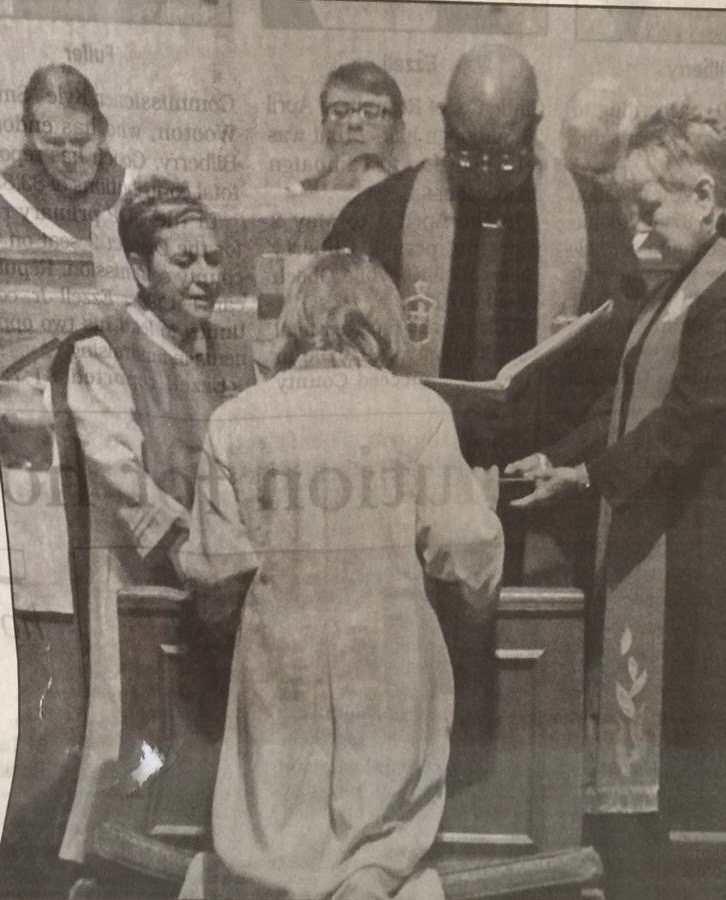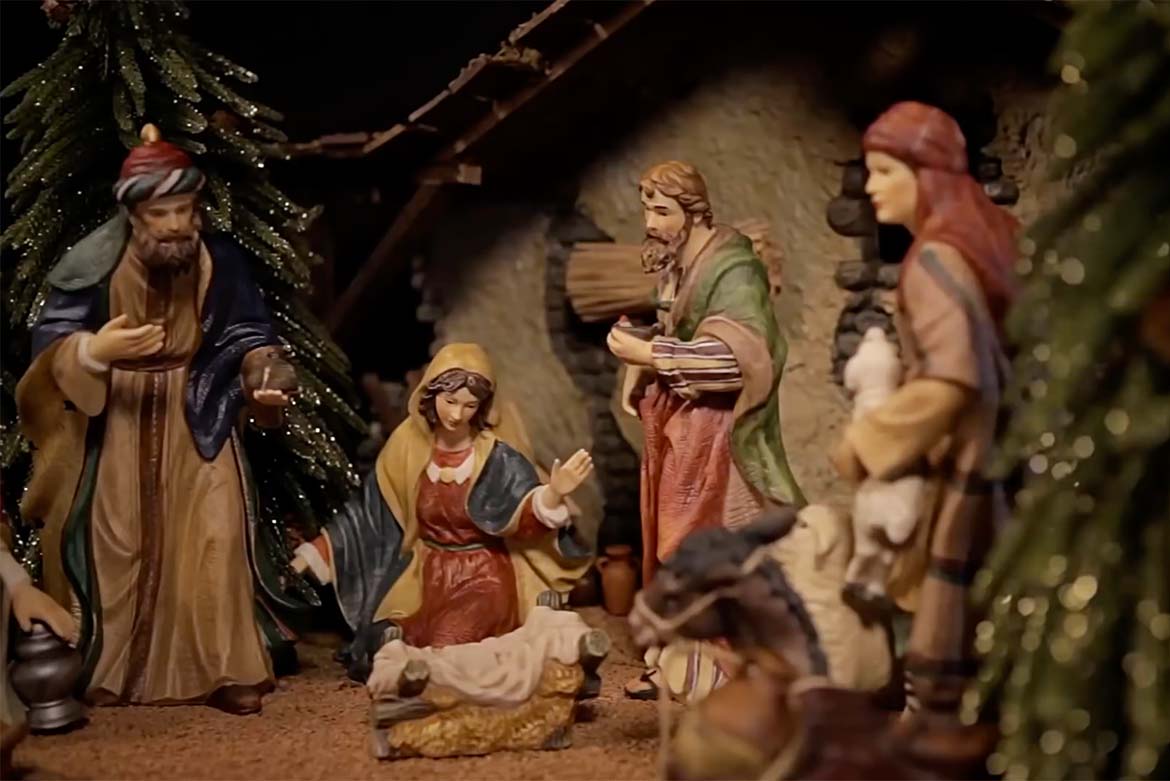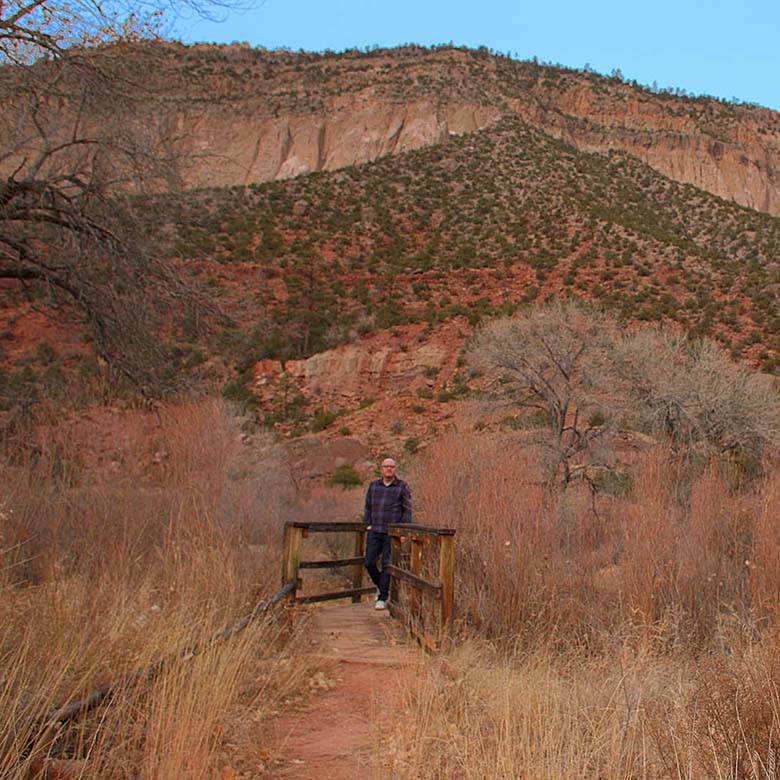
Passing The Torch
This is my absolute favorite photo of my ordination. The photo itself is from the local town
newspaper where I was ordained. The photo is a little grainy and the details are difficult to make
out, which is one of the many reasons this is the photo I have framed in my office.
When I look at this photo, I am reminded of not only the day I was ordained, but I am reminded
of the somewhat grainy and gritty process I took towards that day. I am reminded as well of the
somewhat grainy and gritty place where I was kneeling when United Methodist Bishop, Cynthia
Fierro Harvey, placed her hands on my head. I remember how her hands felt, the shoes she was
wearing, and the smell and feel in the air of the sanctuary where we gathered on this hot summer
Saturday afternoon.
Today, as the anniversary of my ordination approaches, I am reminded of the importance of not
only sharing the grainy and gritty knowledge we have gained on our ministry journeys with
others, but the vital tradition of passing the torch concerning that which we have learned about
ourselves and the leadership positions we have held – the mountain-top experiences, the
growing-edge type of experiences, and everything in-between. This transition of leadership
privilege and knowledge ensures the continuity, growth, and vitality of the church but, it’s
complicated, isn’t it?
We place so much of who we are and our worth in the work that we do, and we often forget the
importance of leaving a place or leadership role in the hands of the generation of leaders who
follow us. We forget that our worth is not tied up with titles or positions, rather how we treated
people and the lessons we gained while holding those roles. Without the passing of the torch and
holding true to who we are as individuals, we are left with gaps in our systems of institutional
leadership, which leads to institutional and personal resentment.
So, I leave you with this – What is your story of grainy and gritty ministries? When was the last
time you shared your story? What does passing the torch look like in your life?

The Gift of Exploration
My first trip abroad took place in 1997. I was in my fourth year at the University of New Mexico
and my dear friend Alison was studying Psychology at Oxford University outside of London.
She invited me to visit her in-between semesters. It was on this trip that I discovered that I do not
mind long plane rides, the hustle and bustle of unfamiliar places, observing people as you
momentarily become part of their world, or simply sharing life with a travel companion – you
get to know a great deal about a person when you travel with them!
To tell you a bit about my relationship with Alison: we met our first few days of our freshman
year of college in the dorms – Santa Ana Dorm to be exact! Alison and I were fast friends and on
Sundays, Alison and I would head to our respective church services – Alison off to a Catholic
service and I to a United Methodist service – and then we would meet for lunch. Alison and I
have shared many life experiences together, including the loss of a parent, adventures in
romantic relationships, friend and family ups and downs, and everything in-between! I believe
we have gifted each other so very much, with the shared gift of travel and curiosity always
present.
I will forever be grateful to Alison for this first adventure across the pond, which taught me so
much about who I am. 38 states, 12 countries, and five continents later, I can fully reflect and
recognize that I have been privileged in my ability to travel and experience this amazing planet
both solo, with family, friends, and groups of like-minded and purposed people.
I was recently asked why it is I enjoy travel so much – “Is it because you are leaving a place or
finding a place?” I would say it’s neither of those things, although it may have at one time or
another been both of those things. What I most appreciate about travel is what I discovered on
that first trip abroad in 1997 – I am a curious person and having the opportunity to be a discreet
interloper in settings which are not my own is both a challenge and a grounding experience for
me. The gift of travel and exploration – both in other regions and in our own neighborhoods –
reminds me that I am not alone in this world and that the bubble I often create for myself is not
the final say.
My hope is that each of you finds a way to explore, challenge, and ground yourself. Be curious
always and get out of your bubble as often as you can!

How We Gather
For the past week, I have found myself serving the United Methodist Church’s General
Conference as a Page. A Page, in this setting, is akin to a legislative runner as the work primarily
takes place up close and personal on the floor of each conference session, ensuring the voting
delegates have what they need, and that information flows with little disruption to those who
need it for the work of the whole to ultimately and seamlessly accomplish the goals of the
conference.
Without getting into the weeds of this process or the polity of the United Methodist Church, I
wanted to take a moment to reflect on how we as humans choose to gather, organize, and
fellowship with one-another. This process of how we do life together is what the fields of
psychology, sociology, and the like refer to as Systems Theory. This intrinsic manner of
organizing dates to the beginning of the reporting of humankind, as all creation came to be
organized in systems of connectionism. We know that systems are not intended to remain static
as evolutions in the system occur and often create stress fractures as a side effect of growth – and
as systems are created to do, the system adjusts.
What has struck me as curious on multiple occasions during the first week of this gathering is
how this subset of people operate in this ever-evolving and stress-fractured system. Unlike
organically created systems, this particular system has been created out of choice, and those who
continue to operate within this system have endured the test of time and continue to do so out of
choice. This choice to gather, organize, and fellowship is one that brings the highest sense of joy
and accomplishment to many, and simultaneously brings the most challenging and painful points
of harm and anguish to many – and the system adjusts.
The choice of how we gather and the system we choose to participate in is ours to make.
Whether we choose to gather with friends or family at the dinner table; or we choose to gather in
conference-style settings; or we choose to gather for worship in community or in solidarity; or
we choose to gather in protest; or we choose to gather over the simple elements of grape and
grain; We choose to gather…
So today, I invite you to take a moment to reflect on how you choose to gather. I encourage you
to reflect on the polarity between joy and accomplishments from systems you choose to
participate in, and the painful points of harm and anguish that these fractured systems sometimes
cause, because it is in the reflection of it all, where we find ourselves – and the system adjusts.
Blessings on this journey,
Kelly
www.ChrysalisCounselingForClergy.org

Re-Ordering the Photo Frame
As I was walking down the photo frame aisle trying to pick the perfect frame in which to highlight my daughter’s recent drill team competition photo, I found myself longing for my family to be in one of the frames: a photo frame family! You know the photo frame family I am talking about – it’s the photo that actually comes with the frame you purchase of the perfectly positioned family where each member is well-quaffed, well-dressed, and clearly overjoyed to be taking family photos because everything in their life is just so. Alas, my family does not represent the photo frame family and my guess is neither does the majority of families working to simply live into their own day-to-day, and complicated beautifully-woven together lives.
During this Lenten Season of contemplation and reflection, I encourage you to re-order and re-define your picture-frame ideal. What does a re-ordering require of you? What does a re-framing of our frames require of us?
Blessings in this Lenten Season,
The Chrysalis Team
Learn More
Faith and Ministry
One of the issues that can exist for pastors is the blurring of the delicate line between faith in God and loyalty to the church. We hear the story often at Chrysalis Counseling for Clergy. A person experiences the grace of God in a profound way, they have a sense of calling to serve God, and they find a way to live out that calling in the church. In one sense this is the beauty of communities of Christ that nurture the gifts of people and empower them to serve.
But what happens when a person’s experience of the church is a difficult one? What happens when a pastor and a congregation are at odds? What happens when a pastor experiences burnout, physical, or mental health issues, in their ministry? Sometimes the experience of ministry makes clergy question their own faith in God. In these moments clergy may equate faith in God with “successful” ministry. Conversely, they may consider the difficulties of ministry as a failure, or lack of faith. In these moments clergy sometimes create a cause/effect relationship between ministry and faith. This is when we at Chrysalis start hearing phrases like, “I just need to pray harder… I need to be more faithful…I can’t forgive myself…”.
Perhaps a healthier understanding of this tension would be to remember that ministry is an expression of our faith in God. Ministry is the vocation in which we live out our faith, but ministry in and of itself is not our faith. Instead, our faith is in God through Jesus Christ and the Holy Spirit. God will never fail us. God’s love is steadfast and unfaltering. Ministry has ups and downs. Ministry has peaks and valleys. Because ministry it is inherently tied up with people it is an experiment in the tension of sin and grace. People can fail us and we can fail people. God’s love never fails.
Perhaps this is why it is helpful for clergy and ministry leaders to make frequent analysis of their own spiritual life and practices. A list of devotional and formative practices that inspire and ground clergy is too numerous to compile here. However, clergy tend to know—whether they admit it or not—if they are really paying attention to the spiritual life.
At Chrysalis Counseling for Clergy we are here to walk alongside clergy in supportive ways. If you are struggling with a scenario like the one described above we can help:
- Differentiate between faith and ministry
- Plot out constructive life/ministry balance
- Help identify spiritual practices
- Listen
We are here to help.
Learn More
When Our Call Feels Like a Burden
What happens when our call feels like a burden? The stories that we just read in Advent all feature God calling people to participate in the mystery of Christ’s birth. Each of them says “yes” in some way or another. Similarly, ministry leaders at some point responded to a call from God for Christian service. While the Advent stories of Joseph, Mary, Zechariah, Elizabeth, the shepherds, and Magi, are each marked with joy, hope, love, and peace, sometimes the call upon our lives as ministry leaders can feel like something else; a burden.
Where did Advent and Christmas leave you emotionally? At the end of a season when pastors are called to “do” so much, how do we reclaim our call when we might feel burdened? On some level most of us probably already know the answers to that kind of question. We know through our training that prayer and spiritual disciplines ground us. We know that reaching out to trusted friends and colleagues helps. We know that taking time to exercise, eat right, and balance our work and personal life, makes a difference.
Nonetheless, sometimes doing those things is too much. When that happens, and when ministry becomes a burden too great to carry, what do we do? First, it is important to understand that you are not alone. Biblical giants like David and Elijah found themselves burdened to the point of being disheartened and down for the count. We also know that in our modern world clergy feel overwhelmed more often than not. Consider also that after Mary was visited by the angel with news almost impossible to believe she journeyed to see Elizabeth. You are not alone.
Second, it is important to know that there are resources that can help. You’re here, at the Chrysalis Counseling for Clergy website. We offer tele-mental health, covenant groups, and renewal retreats. In the short term, contact us if you need a mental health professional to speak with, want to engage in a supportive community, or just need some time away for renewal.
Third, take this as a word of encouragement: even if it is difficult—do something that gives you life, reminds you of your call to ministry, or just excites you about ministry. It doesn’t have to be a big thing. It doesn’t have to change the world. Just do one thing that makes a positive impact on you.
Finally, let us know how we can walk alongside you.
Learn More

